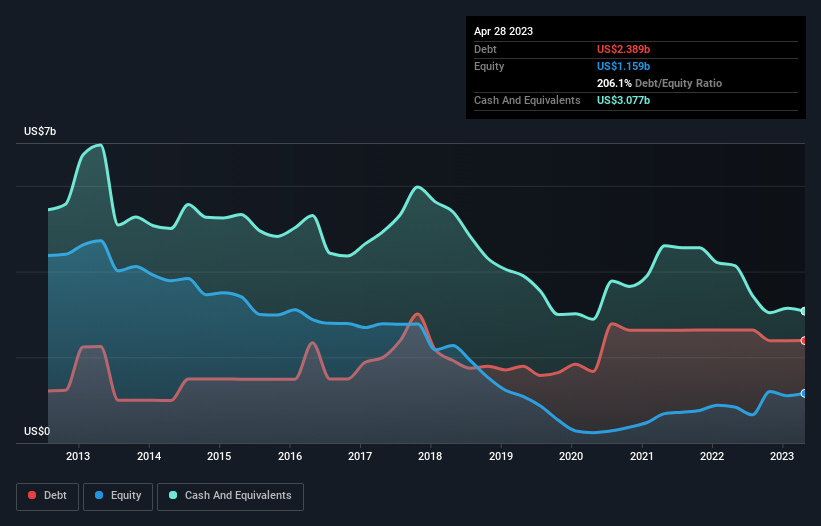- United States
- /
- Tech Hardware
- /
- NasdaqGS:NTAP
Here's Why NetApp (NASDAQ:NTAP) Can Manage Its Debt Responsibly

Some say volatility, rather than debt, is the best way to think about risk as an investor, but Warren Buffett famously said that 'Volatility is far from synonymous with risk.' When we think about how risky a company is, we always like to look at its use of debt, since debt overload can lead to ruin. Importantly, NetApp, Inc. (NASDAQ:NTAP) does carry debt. But the more important question is: how much risk is that debt creating?
What Risk Does Debt Bring?
Debt assists a business until the business has trouble paying it off, either with new capital or with free cash flow. In the worst case scenario, a company can go bankrupt if it cannot pay its creditors. While that is not too common, we often do see indebted companies permanently diluting shareholders because lenders force them to raise capital at a distressed price. Of course, the upside of debt is that it often represents cheap capital, especially when it replaces dilution in a company with the ability to reinvest at high rates of return. The first step when considering a company's debt levels is to consider its cash and debt together.
Check out our latest analysis for NetApp
What Is NetApp's Debt?
You can click the graphic below for the historical numbers, but it shows that NetApp had US$2.39b of debt in April 2023, down from US$2.64b, one year before. But it also has US$3.08b in cash to offset that, meaning it has US$688.0m net cash.

A Look At NetApp's Liabilities
According to the last reported balance sheet, NetApp had liabilities of US$3.47b due within 12 months, and liabilities of US$5.19b due beyond 12 months. On the other hand, it had cash of US$3.08b and US$987.0m worth of receivables due within a year. So its liabilities total US$4.60b more than the combination of its cash and short-term receivables.
NetApp has a very large market capitalization of US$15.8b, so it could very likely raise cash to ameliorate its balance sheet, if the need arose. However, it is still worthwhile taking a close look at its ability to pay off debt. Despite its noteworthy liabilities, NetApp boasts net cash, so it's fair to say it does not have a heavy debt load!
But the other side of the story is that NetApp saw its EBIT decline by 3.7% over the last year. That sort of decline, if sustained, will obviously make debt harder to handle. When analysing debt levels, the balance sheet is the obvious place to start. But it is future earnings, more than anything, that will determine NetApp's ability to maintain a healthy balance sheet going forward. So if you're focused on the future you can check out this free report showing analyst profit forecasts.
But our final consideration is also important, because a company cannot pay debt with paper profits; it needs cold hard cash. NetApp may have net cash on the balance sheet, but it is still interesting to look at how well the business converts its earnings before interest and tax (EBIT) to free cash flow, because that will influence both its need for, and its capacity to manage debt. During the last three years, NetApp generated free cash flow amounting to a very robust 92% of its EBIT, more than we'd expect. That puts it in a very strong position to pay down debt.
Summing Up
Although NetApp's balance sheet isn't particularly strong, due to the total liabilities, it is clearly positive to see that it has net cash of US$688.0m. The cherry on top was that in converted 92% of that EBIT to free cash flow, bringing in US$868m. So we are not troubled with NetApp's debt use. When analysing debt levels, the balance sheet is the obvious place to start. However, not all investment risk resides within the balance sheet - far from it. These risks can be hard to spot. Every company has them, and we've spotted 1 warning sign for NetApp you should know about.
If you're interested in investing in businesses that can grow profits without the burden of debt, then check out this free list of growing businesses that have net cash on the balance sheet.
Valuation is complex, but we're here to simplify it.
Discover if NetApp might be undervalued or overvalued with our detailed analysis, featuring fair value estimates, potential risks, dividends, insider trades, and its financial condition.
Access Free AnalysisHave feedback on this article? Concerned about the content? Get in touch with us directly. Alternatively, email editorial-team (at) simplywallst.com.
This article by Simply Wall St is general in nature. We provide commentary based on historical data and analyst forecasts only using an unbiased methodology and our articles are not intended to be financial advice. It does not constitute a recommendation to buy or sell any stock, and does not take account of your objectives, or your financial situation. We aim to bring you long-term focused analysis driven by fundamental data. Note that our analysis may not factor in the latest price-sensitive company announcements or qualitative material. Simply Wall St has no position in any stocks mentioned.
About NasdaqGS:NTAP
NetApp
Provides a range of enterprise software, systems, and services that customers use to transform their data infrastructures in the United States, Canada, Latin America, Europe, the Middle East, Africa, and the Asia Pacific.
Very undervalued with excellent balance sheet and pays a dividend.
Market Insights
Community Narratives



